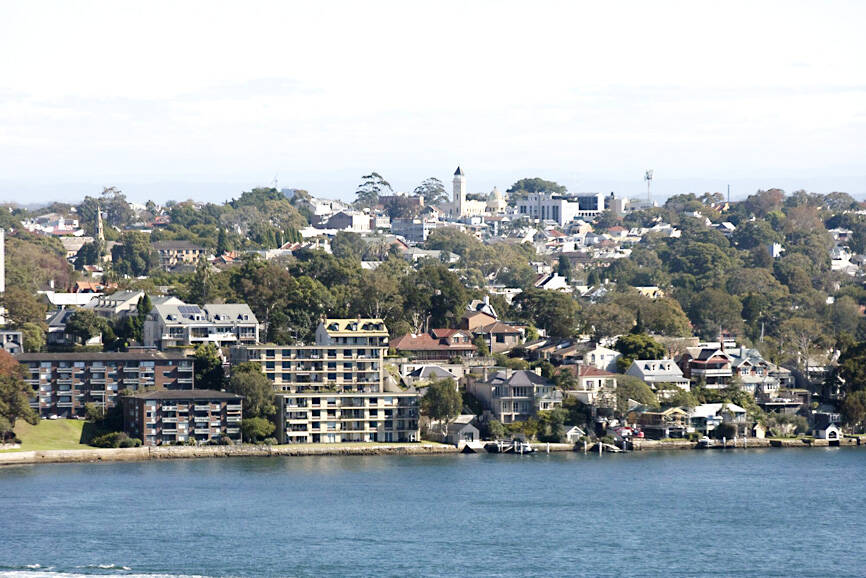Australia is to impose a dramatic rise in fees on foreign buyers of existing homes who leave them empty, the government said yesterday as it tries to ease a rental crisis.
The center-left Labor government said it would introduce new legislation next year to help alleviate tight supply that has left many renters struggling to find somewhere to live.
As supply dwindled, rental prices surged 7.6 percent in Australia in the year to Sept. 30, the sharpest increase in 14 years, official statistics show.

Photo: Bloomberg
“There are too many properties empty around Australia,” Australian Treasurer Jim Chalmers said in an interview with Sky News Australia. “There are not enough homes available to Australians who desperately need them.”
The measures aim to push foreigners to invest in new housing developments instead of buying existing stock, the government said in a statement.
Foreigners are already barred from purchasing established homes in Australia unless they live in the country for work or study, and they are usually required to sell the homes when they leave.
To buy an existing home, foreigners currently pay a foreign investment fee that varies depending on the home price — for example, A$28,200 (US$18,558) for a median-priced Sydney home of a little over A$1 million.
Under the new scheme, the fee would be tripled.
In addition, foreign owners of established homes that are vacant for more than six months would face a higher annual vacancy fee.
That fee — now the same level as the foreign investment fee — would be doubled under the new plan.
The overall effect of the double blow would be a sixfold increase in annual fees for foreigners who leave existing homes vacant.
However, it is unclear if foreign ownership of existing homes in Australia is a big problem for the rental market. Chalmers said vacancy fees imposed on foreign owners of established homes raised only about A$5 million a year.
One report indicated there were just 23 such “breaches” in the past year, Chalmers said, although he believed the numbers “are likely to be underdone.” The government said it would also lower the fees for foreign investors in build-to-rent projects.

The US dollar was trading at NT$29.7 at 10am today on the Taipei Foreign Exchange, as the New Taiwan dollar gained NT$1.364 from the previous close last week. The NT dollar continued to rise today, after surging 3.07 percent on Friday. After opening at NT$30.91, the NT dollar gained more than NT$1 in just 15 minutes, briefly passing the NT$30 mark. Before the US Department of the Treasury's semi-annual currency report came out, expectations that the NT dollar would keep rising were already building. The NT dollar on Friday closed at NT$31.064, up by NT$0.953 — a 3.07 percent single-day gain. Today,

‘SHORT TERM’: The local currency would likely remain strong in the near term, driven by anticipated US trade pressure, capital inflows and expectations of a US Fed rate cut The US dollar is expected to fall below NT$30 in the near term, as traders anticipate increased pressure from Washington for Taiwan to allow the New Taiwan dollar to appreciate, Cathay United Bank (國泰世華銀行) chief economist Lin Chi-chao (林啟超) said. Following a sharp drop in the greenback against the NT dollar on Friday, Lin told the Central News Agency that the local currency is likely to remain strong in the short term, driven in part by market psychology surrounding anticipated US policy pressure. On Friday, the US dollar fell NT$0.953, or 3.07 percent, closing at NT$31.064 — its lowest level since Jan.

The New Taiwan dollar and Taiwanese stocks surged on signs that trade tensions between the world’s top two economies might start easing and as US tech earnings boosted the outlook of the nation’s semiconductor exports. The NT dollar strengthened as much as 3.8 percent versus the US dollar to 30.815, the biggest intraday gain since January 2011, closing at NT$31.064. The benchmark TAIEX jumped 2.73 percent to outperform the region’s equity gauges. Outlook for global trade improved after China said it is assessing possible trade talks with the US, providing a boost for the nation’s currency and shares. As the NT dollar

The Financial Supervisory Commission (FSC) yesterday met with some of the nation’s largest insurance companies as a skyrocketing New Taiwan dollar piles pressure on their hundreds of billions of dollars in US bond investments. The commission has asked some life insurance firms, among the biggest Asian holders of US debt, to discuss how the rapidly strengthening NT dollar has impacted their operations, people familiar with the matter said. The meeting took place as the NT dollar jumped as much as 5 percent yesterday, its biggest intraday gain in more than three decades. The local currency surged as exporters rushed to